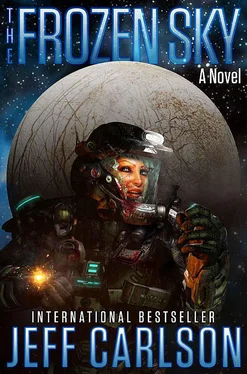Lam caused more problems than we guessed , Vonnie thought, watching Ribeiro’s dark, tired eyes.
The firm set of his mouth gave way to a scowl. Vonnie realized he wasn’t fighting to master his temper. He was humiliated.
“I apologize that the AI reached your zone,” he said. “The responsibility is mine, but I believe my men and I are best suited to this task. We are soldiers. You are not. I would like to make our services available. I suggest a partnership between your people and mine. We can eliminate the AI before it spreads further.”
A partnership? Vonnie thought, scoffing at the idea. She was offended and incredulous.
But Koebsch smiled. “Thank you, Colonel, I agree,” he said.
“We would welcome working alongside the fine astronauts of Brazil,” Koebsch said. “Thank you for your vigilance and for your willingness to protect your neighbors.”
“What are you doing?” Vonnie whispered at Koebsch’s back. “We can’t let them march into our grid!”
Koebsch shushed her. “I would like to coordinate our mutual efforts immediately,” he told Ribeiro. “First, a written agreement is in order.”
“My government will need to approve any legal documents, but I have been instructed to ask for your terms and conditions,” Ribeiro said. His gaze shifted to Vonnie, then back to Koebsch. What was he thinking? The same as her?
Something’s wrong , she thought. We’ve been at odds with Brazil since the war. On Earth, we keep backing A.N. demands for them to pull their troops out of Columbia and Paraguay. In space, too many of our ships run patrols with American destroyers as a show of strength against the FNEE.
Even here, we’ve allocated hundreds of hours to monitoring them — attacking them — and there are only eighteen people combined between our camp and theirs.
Making a deal with the FNEE was unprecedented.
“I think we can use standard distress contracts including limited liability and salvage rights,” Koebsch said. “Within reason, we’ll waive any claims for damage if the AI can be contained.”
“You are generous,” Ribeiro said. “Thank you.”
“I’ll send a write-up to you in a few minutes. Meanwhile I’d like a proposal detailing the number of mecha you’ll send into our grid, their capabilities, and a compatibility study. Will they be able to function with our mecha?”
“My sergeant can provide this data.”
“Excellent.” Koebsch waved Vonnie toward the showphone, then gestured at Ash. “This is Alexis Vonderach, one of our engineers. You’ve met Ash Sierzenga. Vonderach can troubleshoot any challenges with signal integration while Sierzenga handles file-sharing on our side.”
“The famous Vonderach,” Ribeiro said. “You are as beautiful as you are daring, senhora .”
“ Danke schö , Colonel,” Vonnie said. Inside, she was seething at Koebsch. He’d backed her neatly into a corner, saddling her with a workload that would keep her in his sight for the rest of the day — maybe longer.
She’d imagined she could outmaneuver Koebsch and reach Lam before anyone else. Now he’d put her in position to assist the FNEE hunter-killers.
What kind of directives had he received from Earth?
The next moments were hectic. Moving in a daze, Vonnie took the station beside Ash as Koebsch opened another display, speaking with a legal program. Ash refused to meet Vonnie’s eyes, burying herself in her datastreams.
Tavares appeared on Vonnie’s showphone and introduced herself as if they’d never spoken. “My name is Sergeant Claudia Tavares,” she said.
Vonnie didn’t want to put the other woman in a bad spot. “I’m Vonderach. You’re coordinating the FNEE response?”
“Affirmative.” Tavares was visibly relieved.
“Your mecha still use ROM-4 protocols, correct? Our probes can send and receive those signals, but there will be a delay in translation, maybe as much as two femtoseconds per petabyte. Can you lag your response times to match? Otherwise we’ll see progression errors.”
“Affirmative.”
Most of an hour passed in a rapid exchange of adjustments. The AI of the FNEE mecha were dull compared to those of the ESA probes, but in some aspects, the older, larger machines were also more robust. They were built for abuse.
Far below, Probes 110 and 111 stopped advancing through the ice. Koebsch intended to use their sensors like a fence, preventing Lam from moving any deeper into the ESA zone. At the same time, on the perimeter, 115 decrypted most of its datastreams as it was joined by seven FNEE diggers and gun platforms, allowing the FNEE mecha to share its telemetry.
If the Brazilians realized 115 maintained a private channel inside the ESA grid, they said nothing.
Lam’s identity also remained a secret.
Vonnie overheard Ribeiro discussing the AI’s appearance in his mecha with Koebsch. “Our analysts found traces of Chinese programming among its defenses,” Ribeiro said. “They allow human-based AI in their country, you know, and they told us to stay off Europa. They deny unleashing the AI upon our systems, but we believe they tried to hamstring us.”
“That’s not unexpected,” Koebsch said. “Your country buys most of its deuterium from China. They want to protect that income.”
“They are lovers of dogs,” Ribeiro said off-handedly, drawing another smirk from Ash, who covered her mouth by chewing on her thumbnail.
You little sneak , Vonnie thought, not without admiration.
How the heck had Ash made Lam appear like a Chinese AI? Because of his nationality? His original mem files had been based in PSSC ROM-20 protocols, which Vonnie had modified into ESA standard ROM-12 when she assembled him.
Ash could have resurrected his source codes. More likely, Ash had grafted new packets of Chinese code into Lam’s menus. The ESA maintained a library of stolen PSSC encryptions, and Ash had proven masterful at subverting AIs. It helped that her equipment was a cut above everything in the FNEE camp. If she’d laced his menus with PSSC recognition codes, Lam must have sounded like he was trying to hide his origin during his first exchanges with the FNEE when in fact he was only writing that code out of himself. Ash had double-crossed the Brazilians and Chinese, leading one to accuse the other…
What game was Koebsch playing at?
From his indignation with Vonnie, he’d expected the Brazilians to blame the ESA. Yet as soon as the Brazilians asked for help, Koebsch offered them an alliance. That meant the ESA leadership on Earth had prepared Koebsch for either contingency. They’d known about Lam through backchannels with Ash or Frerotte.
I thought I was a step ahead of Koebsch, but he’s left me behind, Vonnie thought. Why? Why is it so important to make the Brazilians our friends instead of leaving them in a loose association with the Chinese?
Down inside the ice, the FNEE mecha crossed into ESA territory. Probe 115 moved with them, then branched away into the catacombs as the surviving ESA spies and Probes 110 and 111 sifted through the ice. They hoped to flush Lam from hiding or to discover his trail.
Near the sunfish colony, the spies registered two flurries of activity — one brief, the other sustained for twelve minutes — but neither was Lam. Both movements were accompanied by sonar calls, and the second included a staccato drumming in the rock. The sunfish were reacting to the mecha invasion.
Other members of the ESA crew appeared on their group feed, indignant and confused.
“Koebsch? Koebsch? Why are there FNEE mecha mixed with our probes!?” Pärnits shouted as O’Neal said, “This goes against everything we’ve accomplished.”
Читать дальше












